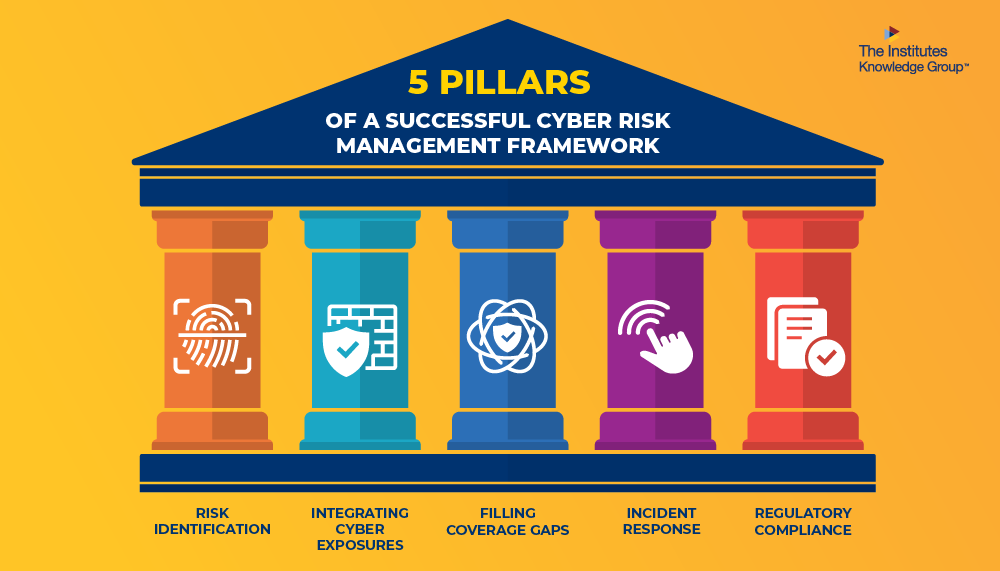Risk Management Strategies
How a Cyber Risk Management Framework Strengthens RMI Operations, From Underwriting to Advisory
In an era of increasingly complex cyber-threats, organizations must be prepared for a wide range of attacks, from ransomware to cryptojacking to targeted data breaches. These risks pose a unique challenge to risk management and insurance companies, where protecting sensitive business and client information is a top priority. That’s why employee preparedness is so important. It’s a key defense not only for an organization, but also for RMI professionals who advise clients on how to manage risks.
Are your employees equipped to guide your organization and clients through the nuances of cyber risk? It’s predicted that the annual global cost of cybercrime will reach $15.63 trillion by 2029, an increase from $8.15 trillion in 2023. So the question isn’t if an organization will face cyber threats, but when. By developing a comprehensive cyber risk management framework, your team can safeguard your organization and become a trusted resource for clients.
What is a Cyber Risk Management Framework?
To build confidence in handling cyber threats, it’s essential to have a cyber risk management framework in place that guides response efforts and continues to be relevant even as risks change and evolve over time. A cyber risk management framework is a structured approach to identifying, assessing, managing, and mitigating cyber risks. It provides a lasting roadmap to help companies address vulnerabilities, implement proactive safeguards, and effectively respond to incidents.
For RMI professionals, this framework can be a highly valuable tool for advising clients on effectively navigating cyber risk. These threats have grown beyond technical issues to affect the entire organization. From financial losses, to operational disruptions, to reputational damage, the consequences of a cyber-attack can be devastating to the entire organization. That’s why managing cyber risk, risk assessment, and continuous upskilling is crucial for every employee.
Why Employee Upskilling is the Cornerstone of Effective Cyber Risk Management
Despite the rise of AI and predictive modeling, your employees are the first line of defense against cyber risks. They are the guardians of your organization's data and the trusted advisors to your clients. And the best way to strengthen these crucial defenses is to incorporate robust cyber risk management training into your learning and development programs. This includes ensuring employees are familiar with your cyber risk management framework, can apply it to real-world situations, and can make practical adjustments when needed.
Consider having employees earn their Associate in Cyber Risk Management™ (ACRM™) from The Institutes Designations. This new designation is the first of its kind and is designed to help build lasting cyber resilience. Plus, investing in this specialized upskilling will not only help employees predict and prevent losses, but also grow your organization’s reputation as a leader in cyber security.

5 Pillars of a Successful Cyber Risk Management Framework
When building an effective cyber risk management framework, it’s important to account for the entire insurance value chain and continuously monitor the evolving risk landscape. Make sure your plan covers these five elements:
Risk Identification
Employees need the skills to identify vulnerabilities, both internally and for clients. By spotting risks early, they can help prevent potential issues and keep systems secure.
Integrating Cyber Exposures
Cybersecurity risks should be treated as an integrated part of any risk management strategy. Employees trained in cyber exposures can help clients see where cyber threats fit into the bigger picture.
Filling Coverage Gaps
Traditional insurance policies may fall short of fully covering cyber risks. Employees should be trained to identify these gaps, advise clients on potential vulnerabilities, and recommend better coverage options.
Incident Response
Responding quickly to a cyber-attack can make all the difference. Employees should know how to efficiently guide clients through incident response processes, minimizing damage from breaches.
Regulatory Compliance
Cyber regulations are constantly changing. Employees need to stay up to date on these rules to help clients remain compliant and avoid legal risks while securely managing threats.
Equipping Your Workforce for Future-Ready Cyber Risk Management
Equipping your team with a strong cyber risk management framework is essential to managing cybersecurity risks. Empower your employees to invest in specialized training and upskilling with The Institutes Designations’ new Associate in Cyber Risk Management™ (ACRM™). This designation will help provide them with an adaptable framework to stay ahead of emerging cyber-attacks and better manage risks.
Enable your team to become skilled in cyber resilience strategies with the Associate in Cyber Risk Management™ (ACRM™) designation today!

About the Author
Diane Hanlon is Head of Sales and Market Development at The Institutes, where she leads sales strategy and client partnerships. She works with Learning and Development leaders to design workforce learning pathways and serves on the Board of the Society of Insurance Trainers and Educators.
